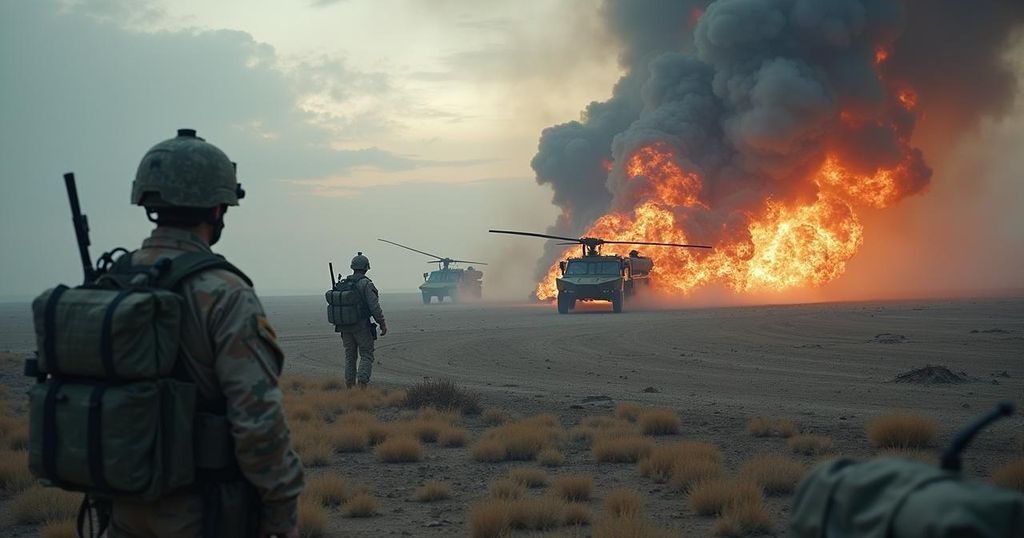Trump’s Military Plans: A Shift Towards Domestic Deployment in the U.S.
Donald Trump has proposed utilizing the military for domestic purposes, including deploying troops to the U.S.-Mexico border and addressing civil unrest, if he is reelected. His rhetoric frames certain Americans as an “enemy from within,” raising alarms regarding the military’s role in domestic affairs and the potential for significant policy shifts that could challenge established legal norms and civil rights. This vision, while supported by some Republicans, is met with concern from human rights advocates and civil liberties organizations, prompting calls for legislative safeguards.
Former President Donald Trump has articulated his intent to leverage the military for domestic purposes should he reclaim the presidency in the upcoming election. If reelected, Trump envisions a significant transformation of the military’s role within the United States, proposing a strategy that would involve the deployment of troops to secure the southern border and address issues pertaining to immigration and civil unrest. Furthermore, he has expressed a desire to remove military personnel who oppose his ideological viewpoints. Trump characterized certain segments of the American populace as an “enemy from within,” suggesting that they pose a threat that could justify military intervention on U.S. soil. His campaign outlines plans that could blur the lines traditionally established between military and domestic law enforcement roles, stirring concern among human rights advocates and raising important constitutional questions. In recent rallies, Trump has exaggerated the state of certain cities, identifying them as overrun by criminal activity and advocating for aggressive measures to restore order. This rhetoric aligns with his broader agenda, dubbed Agenda 47, which includes moving troops from overseas assignments to bolster border enforcement and combat drug trafficking. Key Republican figures support Trump’s militaristic approach to immigration, yet some within the party express reservations about the implications of deploying active-duty military personnel domestically. The reliance on military assets could intensify existing tensions within the Republican Party, especially concerning traditional foreign policy versus Trump’s isolationist stance. As Trump’s campaign unfolds, he may wield existing federal laws to enact policies such as mass deportations, potentially invoking his wartime powers to bolster his strategies against dissent. Opposition from Democrats in Congress highlights the evolving discourse regarding the military’s role in civilian matters and the potential for unchecked power should Trump assume office again. This possibility has prompted calls for legislative updates to ensure safeguards are put in place regarding the military’s domestic use, adding another layer to the ongoing national debate about immigration, security, and civil liberties. In summary, Trump’s proposals represent a radical rethinking of military involvement in American domestic affairs, with profound implications for national governance and civil rights. Should he return to power, significant changes could occur regarding how and when military forces are utilized within the United States.
The discussion surrounding the role of the military in domestic affairs arises from historical precedents and ongoing debates about civil rights and governance. The military has traditionally been viewed as a force for national defense, with strict legal boundaries against its involvement in civilian matters. However, proposals to deploy military personnel for enforcing domestic policies, particularly relating to immigration and law enforcement, have gained traction in certain political circles over the past few years. As the country navigates complex social issues, this discourse reflects broader themes of national security, authority, and civil liberties, ensuring that the implications of military involvement are critically examined.
The potential for Trump to deploy military forces domestically raises significant concerns regarding the balance of powers and the preservation of civil liberties in the United States. His aggressive rhetoric and strategic plans may indicate a fundamental shift in how military resources are perceived and utilized, challenging existing norms and legal frameworks. The ongoing dialogue surrounding these issues is crucial as the nation approaches the forthcoming elections, with broader implications for governance and the rule of law apparent in both Democratic and Republican narratives.
Original Source: www.pbs.org








Post Comment